South Africa’s largest cellphone network operator gifted lucrative partnership deals to companies linked to former premier Ace Magashule in relation to voice and data contracts Vodacom scored from provincial government departments in the Free State.
One of the deals has been reported to deputy chief justice Raymond Zondo’s Commission of Inquiry into State Capture.
Vodacom signed the first of two dubious partnership agreements with Free State businesses in 2014 after Magashule met with Vodacom CEO Shameel Joosub in Cape Town.
The meeting took place while a tender for supplying voice and data services to Magashule’s provincial government was still being concluded. Vodacom was one of the bidders.
The then premier told Joosub that he was concerned about the cellphone giant’s commitment to “BEE procurement and local empowerment”, documents obtained by Scorpio reveal.
Later that year, in a letter to Magashule, Joosub vowed that Vodacom would divert nearly R600-million to emerging companies in the Free State and the Northern Cape. The cellphone giant then partnered with Marangrang IT, a company with strong links to Magashule and the ANC, while Vodacom won the Free State’s voice and data tender.
A similar partnership with Supana Technologies, another entity linked to Magashule, came about in 2017 after Vodacom had won government’s massive transversal contract for cellphone services. The National Treasury’s RT15-2016 transversal contract all but guaranteed that Vodacom would clinch contracts from national and provincial government departments and stood to bring in estimated revenues of around R5-billion.
Thanks to their association with Vodacom, Marangrang IT and Supana Technologies are said to have earned at least R20-million in commissions and other revenues as a direct result of the contracts Vodacom secured from the Free State provincial government.
Some of Vodacom’s other BEE partners in the province claim the cellphone firm sidelined them in order to make way for Marangrang IT and Supana Technologies. When one of these partners queried Vodacom’s actions, Vodacom employees allegedly told him that they were under “political pressure” from Magashule.
Vodacom’s dealings with Supana Technologies triggered an internal investigation that eventually saw the cellphone giant report details on some of its dealings in the province to the Zondo Commission.
The cellphone giant has been tight-lipped about the report’s findings.
“Vodacom has provided information to the Zondo Commission. Vodacom does not want to interfere with the Commission’s work, neither do we believe that it is appropriate to answer the questions posed while the Commission’s inquiry is in progress,” the company initially told Scorpio.
After further queries about its partners in the Free State and its executives’ interactions with Magashule, Vodacom said it “rejects this insinuation as false and baseless that it secured the award of any Provincial or National contract/s in an untoward manner, including as a result of our stakeholder engagement programme”.
But our investigation shows that Vodacom’s top executives, including CEO Joosub and then head of business Vuyani Jarana, interacted with Magashule around the time in which the company won lucrative contracts from the provincial government. What’s more, these engagements coincided with the partnership deals the politically connected companies scored from Vodacom.
Documents and source accounts suggest Magashule may have strong-armed Vodacom into engaging with local partners linked to the then premier, and that the cellphone giant was happy to oblige in exchange for contracts from the provincial government.
Scorpio sent Magashule sixteen detailed questions regarding the provincial government contracts, his engagements with Vodacom, his alleged role in helping Marangrang IT and Supana technologies partner with Vodacom, and his ties to the owners of the aforementioned companies.
Speaking through his lawyer, Victor Nkhwashu, Magashule referred us to his former office.
“Your questions and statements refer to the period during which our client was Premier of the Free State. Accordingly, we advise that the office of the Premier of the Free State will be better placed to respond to your questions,” stated Nkhwashu.
Magashule’s lawyer offered no responses to our detailed queries but instead issued broad denials.
“The allegations that you make against our client are baseless, misleading and devoid of truth. They are meant to tarnish our client’s name and our client shall not participate in this trial by the media.”
Click here to read Magashule’s full response.
The owners of Marangrang IT and Supana Technologies both strongly denied any wrongdoing. Their full responses are available elsewhere in this story.
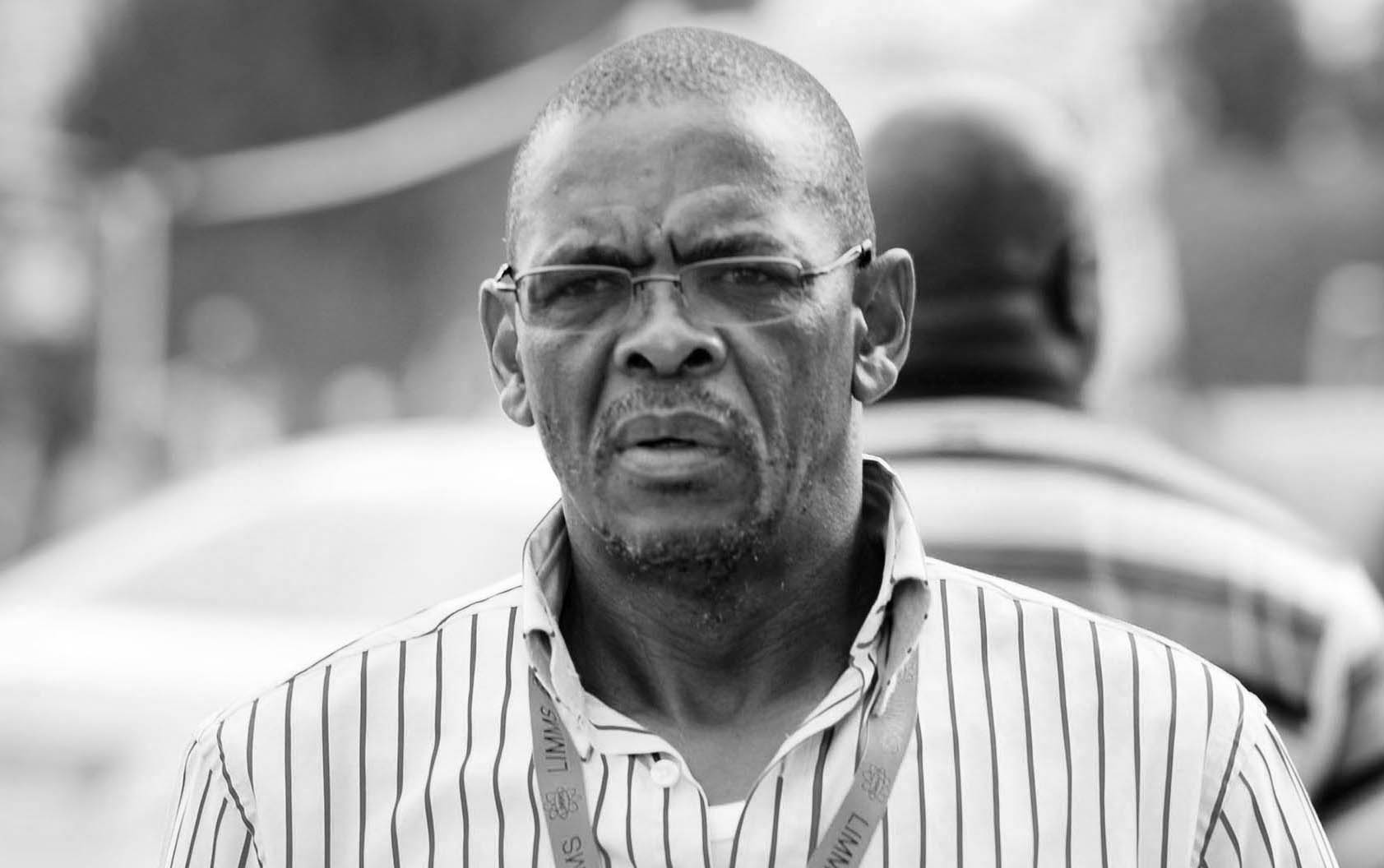
Ace Magashule at the ANC Mangaung elective conference at the University of Free State on December 17, 2012, in Bloemfontein, South Africa. (Photo: Leon Sadiki / City Press / Gallo Images / Getty Images)
State of play
Former president Jacob Zuma’s 2014 State of the Nation Address (SONA) was one of his less memorable ones.
Representatives from the boisterous Economic Freedom Fighters (EFF) weren’t in parliament yet, and former president Nelson Mandela’s death two months before enveloped the event in a veil of sombreness.
Among those in attendance was then Free State Premier Ace Magashule. But he had not only travelled to Cape Town to listen to his boss’s speech.
Magashule’s official diary, obtained through a PAIA application, reveals that he had a “meeting with CEO Vodacom” scheduled for that morning, several hours before Zuma’s SONA was due to start.
Shameel Joosub, who had taken over as Vodacom CEO in March the previous year, would have had much to discuss with Magashule.
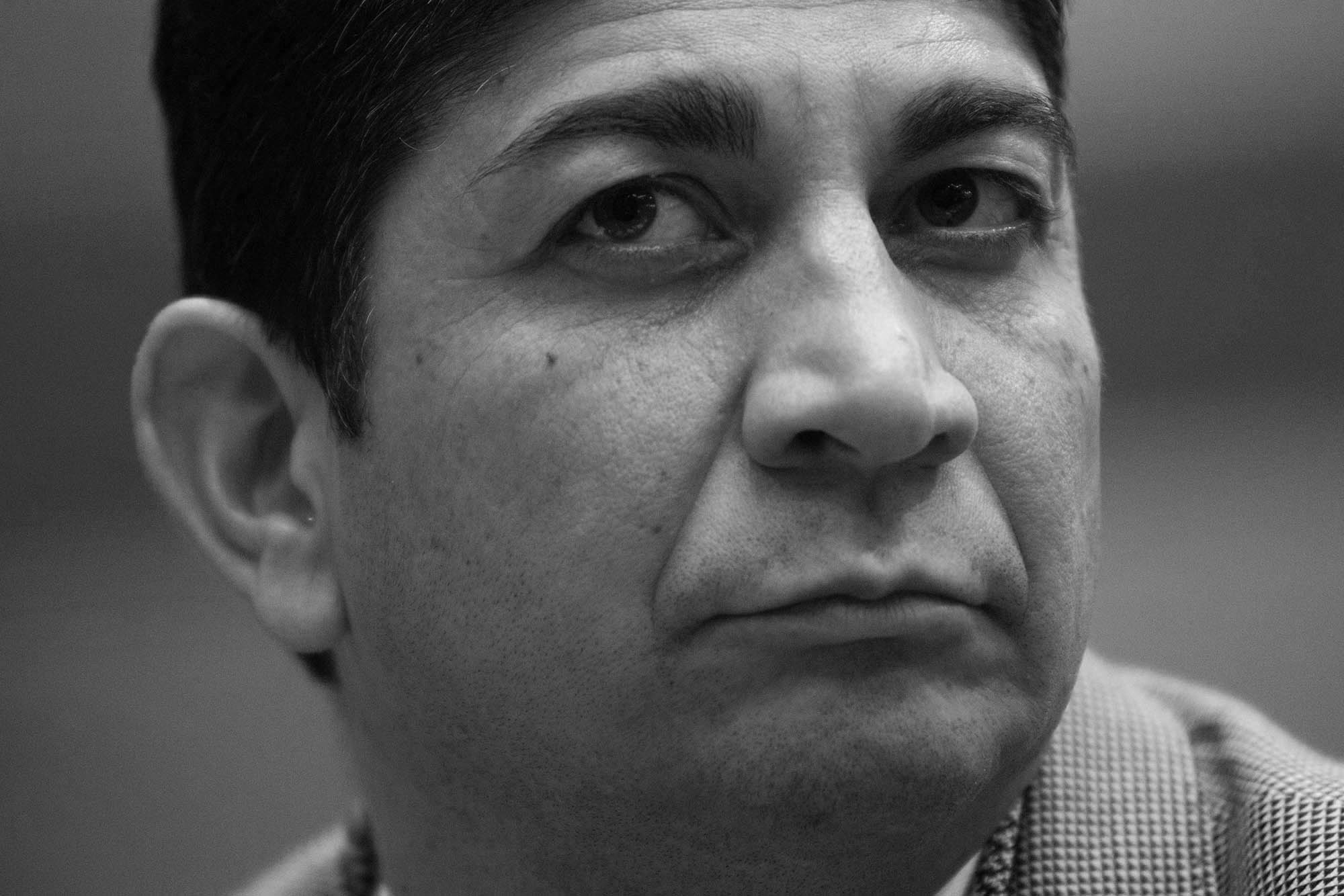
Shameel Joosub, chief executive officer of Vodacom Group Ltd.(Photo: Waldo Swiegers/Bloomberg via Getty Images)
In October 2013, four months before Zuma’s SONA, the Free State provincial treasury had advertised a tender for the supply of “voice and data solution services” for the province’s eleven departments. It would be a transversal contract. This meant the respective departments could all sign contracts with whichever company or companies the provincial treasury appointed, without having to run their own tender processes.
Vodacom was among several companies in the run for the contract.
By the time Magashule and Joosub met in Cape Town, the tender process for the Free State’s voice and data contract should have been concluded.
The closing date for the tender was 15 November 2013. Nearly three months had gone by, but the provincial treasury had not yet announced who the winning bidder or bidders were. According to sources who had been close to the process, some of the bidders were getting anxious.
The person responsible for the delay was none other than Magashule, our sources claim. They maintain that officials from the provincial treasury repeatedly asked the premier if they could award the tender, but Magashule allegedly told them to wait.
We do not know whether Joosub brought up the issue of the delayed tender outcome when he met Magashule.
However, in a letter Joosub sent Magashule in April 2014, the Vodacom CEO summarised certain “strategic issues” Magashule had “flagged” during their discussion in Cape Town. One of the concerns Magashule had expressed involved Vodacom’s commitment to “BEE procurement and local empowerment”, according to the letter.
In other words, the then Free State premier and the Vodacom CEO had spoken about the cellphone giant’s partnerships with local companies in the Free State.
Judging by Joosub’s letter, Vodacom had been quite eager to assuage the then premier’s concerns.
“… the total investment in the region (including Northern Cape) was R300-million in the past year. We will ramp this up to R569-million in the next year. This investment will create a significant number of jobs in the province,” reads an extract from Joosub’s letter.
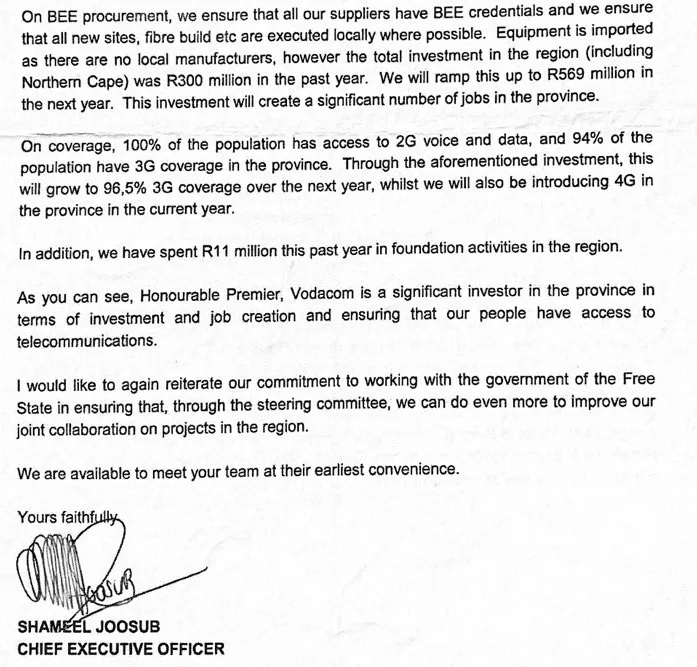
Vodacom was therefore planning to nearly double its expenditure on goods and services from local companies in Magashule’s backyard. This while Vodacom, along with its fellow bidders, were waiting for the Magashule-led Free State government to crown the winner of the lucrative transversal contract for voice and data services.
With the tender process effectively in limbo, the then-premier would have been perfectly positioned to strong-arm bidders like Vodacom into partnering with local Free State businesses of the premier’s choosing. And, with the voice and data tender still up in the air, Vodacom may have been all too eager to play along.
Vodacom strongly denies that this is what happened. The company twice stated that the “inference” that it had won any provincial or national government contracts as a result of its “stakeholder engagement” with the likes of Magashule or other government leaders was “false and baseless”.
But, as we’ll come to see, Vodacom did end up as the major winner in the aforementioned tender while gifting a lucrative partnership agreement to Marangrang IT, a company with close ties to Magashule and the ANC.
Vodacom emphasised that its CEO’s engagements with Magashule in no way influenced its decision to rope in Marangrang IT.
“In line with Vodacom’s strict procurement policy and procedures, Mr Joosub does not get involved in the appointment of suppliers. It is incorrect to assume that Mr Joosub was in any way involved in appointing Marangrang IT,” the company stated. Read Vodacom’s full response here.
Vodacom’s government man
Joosub was not the only top Vodacom executive that interacted with Magashule during that time.
In his April 2014 letter to Magashule, the Vodacom CEO introduced the then-premier to Vuyani Jarana, who headed the company’s enterprise and government business unit. Jarana would later leave Vodacom for a relatively short stint — from August 2017 to June 2019 —as CEO of the embattled South African Airways (SAA).
Meanwhile, back in 2014, Joosub suggested that Vodacom and the provincial government should form a “joint steering committee” to address the concerns Magashule expressed at the meeting in Cape Town, including those regarding Vodacom’s BEE procurement. Jarana would lead the committee on Vodacom’s behalf, Joosub wrote to Magashule.
A particular interaction between Jarana and the then premier has relevance.
At some point after the SONA, Jarana flew from Johannesburg to Bloemfontein, where he and Magashule briefly met on the steps in front of the main entrance to the President Hotel in the city’s Naval Hill area. The Magashule administration regularly used this hotel for Executive Council (Exco) meetings and other gatherings.
Given what would transpire thereafter, some of our sources now reflect on that meeting with raised eyebrows.
“The Premier Hotel meeting was specifically arranged for Vuyani Jarana to meet with the premier. Ace had meetings there and Vuyani arrived as the premier walked out so they had a discussion,” claimed one of our sources.
The meeting apparently lasted for about ten minutes.
According to this person, Vodacom at that juncture had other black-owned Free State companies in mind for its local partnerships, not Marangrang IT. But after Jarana’s brief encounter with the premier, two crucial developments fell in place — Vodacom won the lion’s share of the province’s transversal contract and Marangrang IT was “on-boarded” as a local partner to the cellphone firm, said the source.
Marangrang IT’s owner, Thami Lomo, has deep ties to the ANC in the Free State, which we’ll delve into further on.
He also happened to be a fan of Magashule.
On 18 June 2014, Lomo posted a picture of Magashule addressing the National Assembly on his Facebook page. “Ace Magashule has taught well here,” he wrote next to the image.
About a month later, in mid-July 2014, Godfrey Mahlatsi, the provincial treasury’s CEO, informed his colleagues that Vodacom had won the transversal contract, according to records from an Exco meeting. Cell C eventually also got a slice of the contract, albeit a much smaller one.
When Vodacom staffers held their first “roll-out” meeting for the new project later in 2014, Marangrang IT was suddenly introduced to them as the cellphone firm’s new partner.
“We were told they had more IT capacity,” one of the sources told us.
Vodacom also had agreements with four other Free State businesses, but our sources claim Marangrang IT ended up earning by far the most money as a result of the deal.
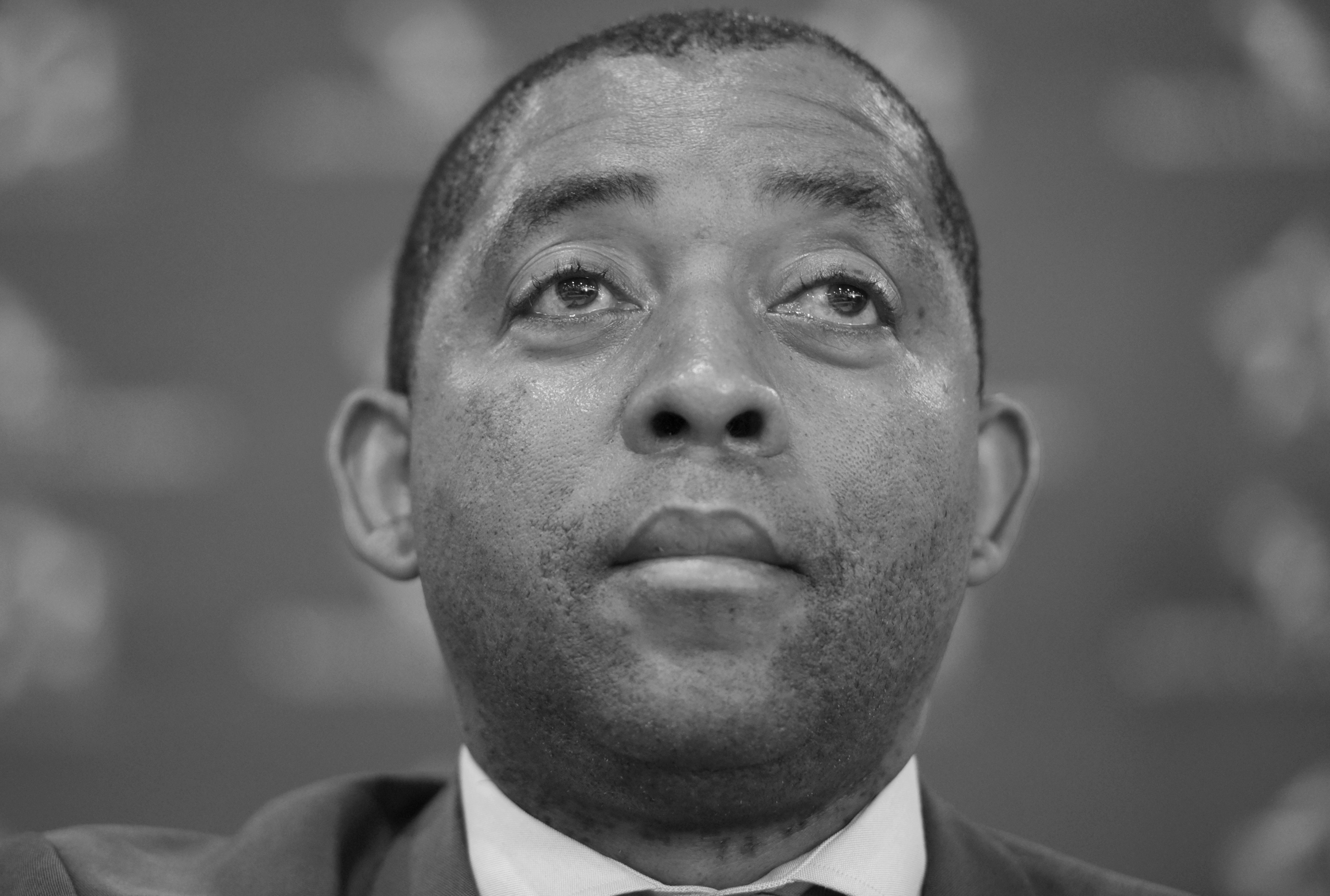
Former Vodacom Executive Vuyani Jarana during a media briefing at the O.R Tambo International Airport Park on November 08, 2017 in Kempton Park, South Africa. (Photo: Gallo Images / Rapport / Elizabeth Sejake)
Some of our sources suspect that Magashule may have used his brief meeting with Jarana to ensure that Vodacom would pick Marangrang IT as a local partner for the provincial contracts.
Jarana strongly denied this. He also denied that he had travelled to Bloemfontein specifically to meet Magashule.
He admitted that he had met the then-premier on the hotel’s staircase, but he offered a different account of that day’s events.
According to Jarana, a team from Vodacom was supposed to do a pitch to the province’s executive council.
“The Vodacom team was already in the meeting and I arrived in Bloemfontein late as my flight [from Johannesburg] was delayed and I was late to the meeting,” the former Vodacom executive told Scorpio.
“When I was getting to the meeting venue, the then premier of the Free State Ace Magashule was leaving the meeting already,” he added.
Jarana says he was then introduced to Magashule by one of his (Jarana’s) staff members.
“After the brief introduction as he was leaving, I went into the meeting and supported my team presentation,” claims Jarana.
But did Magashule use this encounter, however fleeting it may have been, to suggest that Vodacom needed to bring Marangrang IT on board?
“Magashule would not instruct me to bring Marangrang IT or any supplier for that matter to be a Vodacom partner, it is not possible,” said Jarana.
He claimed that Marangrang IT and Kathabo Technologies, another Free State company, were already signed up as partners by the time he bumped into Magashule.
But Scorpio’s sources alleged that this was not the case.
“Only Kathabo was in at the time, Marangrang came after. This meeting was before the tender award,” one of them told us.
Vodacom refused to divulge information that could have resolved the dispute, including the date on which Marangrang IT was formally signed up as a partner.
“Vodacom is not at liberty to reveal details of the award and terms of any individual contract to third parties,” the company stated.
Jarana said he could not recall when in 2014 the meeting took place.
Like Joosub, Jarana maintains that he played no role whatsoever in Vodacom’s appointment of partner companies.
“As the chief officer for Vodacom business I was far removed from partner selection and onboarding, the responsible national and regional managers and executives were responsible for partner onboarding,” stated Jarana. His full account of how Vodacom’s “onboarding” process worked, along with his responses to other queries, can be accessed here and here.
Marangrang IT’s Thami Lomo said he first approached Vodacom for a possible partnership “around February 2014”. This means he had approached Vodacom during the same timeframe in which Magashule and Joosub had met at the SONA in Cape Town.
According to the businessman, Vodacom “onboarded” Marangrang IT in “around June” that year.
If this is correct, the cellphone giant had therefore formalised its partnership with Lomo’s company about a month before the provincial treasury’s CEO, Godfrey Mahlatsi, announced the outcome of the voice and data tender.
This sequence of events supports suspicions that the provincial government somehow compelled Vodacom to partner with Marangrang IT before Vodacom could clinch the transversal contract.
A member in good standing
By the time Vodacom had won the Free State’s voice and data contract, Marangrang IT was ideally placed to tap into the deal.
The company’s owner, Thami Lomo, is a self-described “member of the African National Congress in good standing”. He told Scorpio that his “political affiliation does not relate in any way to Marangrang’s business ventures as far as [he was] concerned.”
But these ties didn’t harm his company’s chances of teaming up with Vodacom either.
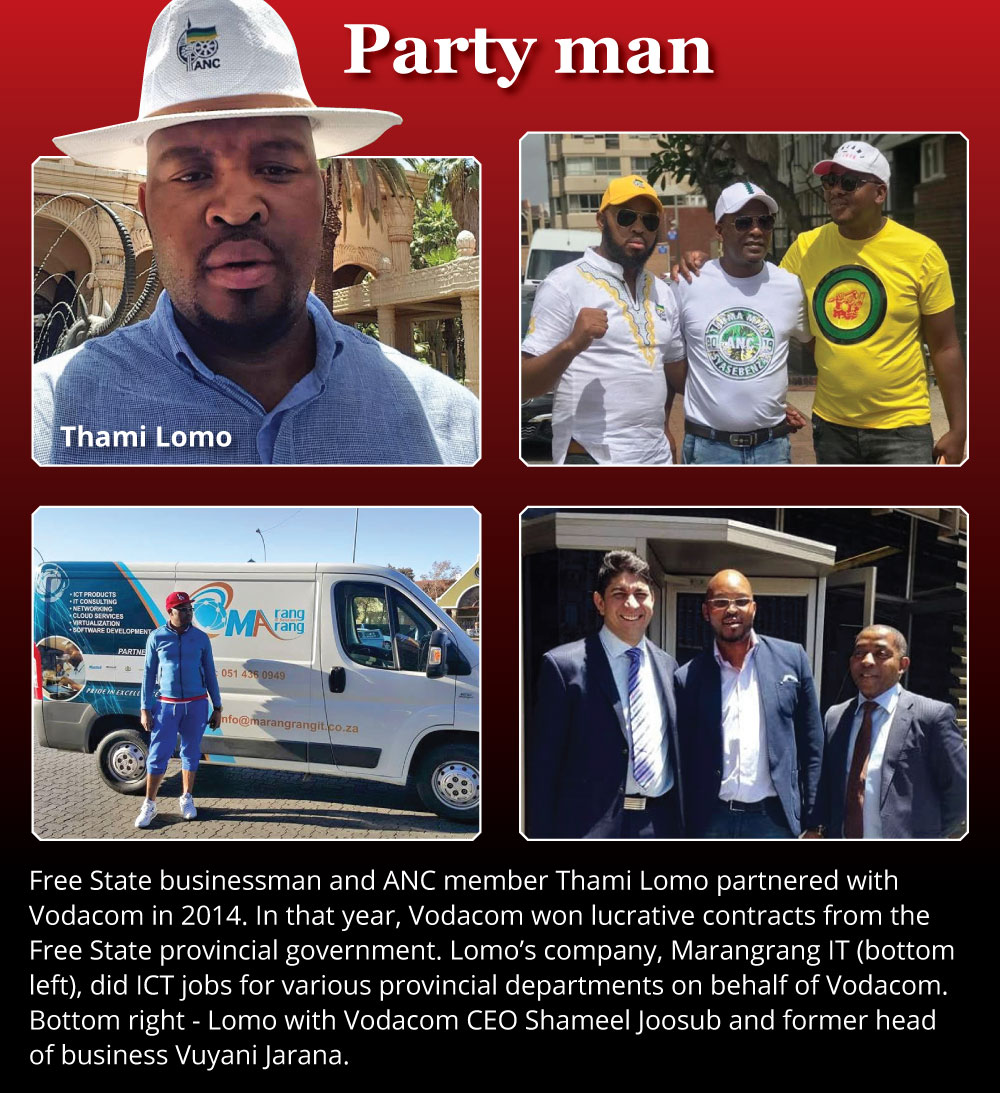
Before putting all of his time and energy into Marangrang IT, Lomo was the Information and Communications Technology (ICT) manager at the Xhariep District Municipality in the southern Free State. He took up this position in 2010 and left in 2013.
In other words, Lomo resigned from his job at the municipality in the same year in which the Free State treasury advertised the voice and data tender.
“I resigned because I considered it time for me to leave and pursue other avenues,” Lomo told us.
Although he denied being close to Magashule, Lomo indicated that he has known the former premier for many years. Read his full responses here and here.
“As a member of the ANC and resident of the Free State I have met comrade Ace Magashule on a number of occasions, either at the organisation’s events or during his government programmes as an MEC and subsequently as premier of the Free State.”
Our sources suggested that Lomo might have been a little closer to Magashule than he wanted us to believe.
“The ICT manager job at the district municipality is a deployment-level position. This means Magashule, as the ANC’s leader in the province at the time, would have had a direct role in Lomo’s appointment there,” one ANC insider told us.
A second top ANC figure in the province agreed.
“In fact, he [Magashule] had a hand in the deployment taking place in all strategic positions of the provincial government and in municipalities,” claimed this source.
But Lomo took strong exception to the idea that Magashule effectively placed him at the municipality.
“… I must outrightly tell you that it is despicable of you to even believe that an ICT Manager position is a deployment position because a journalist and author of your stature should know better. I suggest you get your mind right as to what deployment is and stop asking me such stupid questions like this one,” said Lomo.
But his former job at the municipality by no means represents Lomo’s only purported link to Magashule and the ANC’s top brass in the province.
The entrepreneur also happens to be a former business partner to one of Magashule’s most ardent supporters in the ANC’s provincial structures.
In 2011, while working at the municipality, Lomo registered a company called Ditlabonyane Youth Trading and Projects with Sello Pietersen, the spokesperson for the ANC Youth League in the Free State. If that name sounds familiar, it might be because Pietersen was among a band of Magashule supporters who vowed to burn copies of this journalist’s book, ‘Gangster State’, when it was released in April 2019.
Lomo told Scorpio that the Youth League spokesperson is his cousin.
Lomo teams up with Ace’s houseguest
Lomo’s relationship with one Suping Motsemme represents yet another link to Magashule, one that has particular relevance in the context of the Vodacom deal. Motsemme’s aunt is Mosidi Motsemme, who has three children with Magashule. In March 2019, Scorpio reported on a house Magashule and Mosidi Motsemme shared in an upmarket residential estate outside Bloemfontein.
When Vodacom appointed Marangrang IT as one of its Free State partners in 2014, Lomo roped in Suping Motsemme to work for Marangrang.
Lomo told us that he knew Motsemme from “way back” and that his employee was responsible for Marangrang’s “project and office management”.
He said he wasn’t aware of “any close association between Suping Motsemme and Mr Ace Magashule”, but that he was aware of the fact that Mosidi Motsemme was his associate’s aunt.
However, several sources familiar with the Vodacom saga alleged that Magashule and his girlfriend, Mosidi, instructed Lomo to bring Suping Motsemme into the Marangrang IT fold.
Lomo strongly denied this.
“The decision to employ Mr. Motsemme was that of the company owner/shareholder [Lomo] and no one else,” said the businessman.
Motsemme did not want to comment on the circumstances around his appointment at Marangrang IT.
Jarana, meanwhile, stated that he first met Suping Motsemme when Vodacom’s business management team did a presentation for an opportunity the company had been pursuing.
“He was introduced as an employee of Marangrang, an ICT Small Medium Enterprise who was one of the two partners to Vodacom Business Free State, partnering in the opportunity,” said Jarana.
“I was not aware of any relationship between Suping Motsemme and Ace Magashule,” claimed Vodacom’s former head of business.
But he added the following: “It was only towards my exit at Vodacom that I heard that Suping may have an association with Ace Magashule, a hearsay I never got to prove.”
According to Jarana, Vodacom would have performed due diligence on Marangrang, but their “system” would not have flagged any potential links to Magashule.
“It would have required an investigation, only if you suspected it,” said Jarana.
However, a simple scroll through Suping Motsemme’s Facebook photos would have shown Vodacom that any suspicions about the young businessman’s ties to Magashule was backed up by more than just “hearsay”.
In 2012, Motsemme posted a series of photos of him rubbing shoulders with the ANC’s most senior leaders, including Magashule, Gwede Mantashe and then president Jacob Zuma.
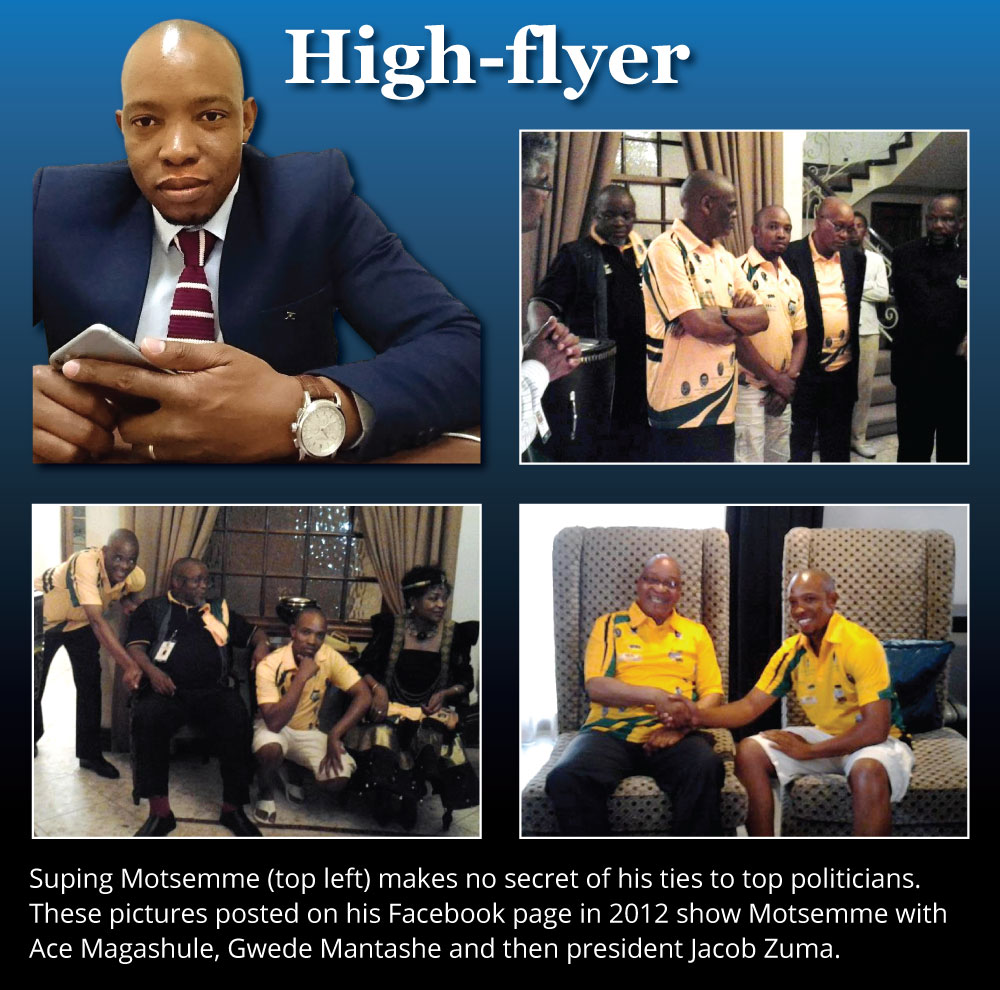
Had Vodacom looked closely enough, it would also have found this picture of a shirtless Motsemme next to the swimming pool at Free State House, the premier’s official residence in Bloemfontein.
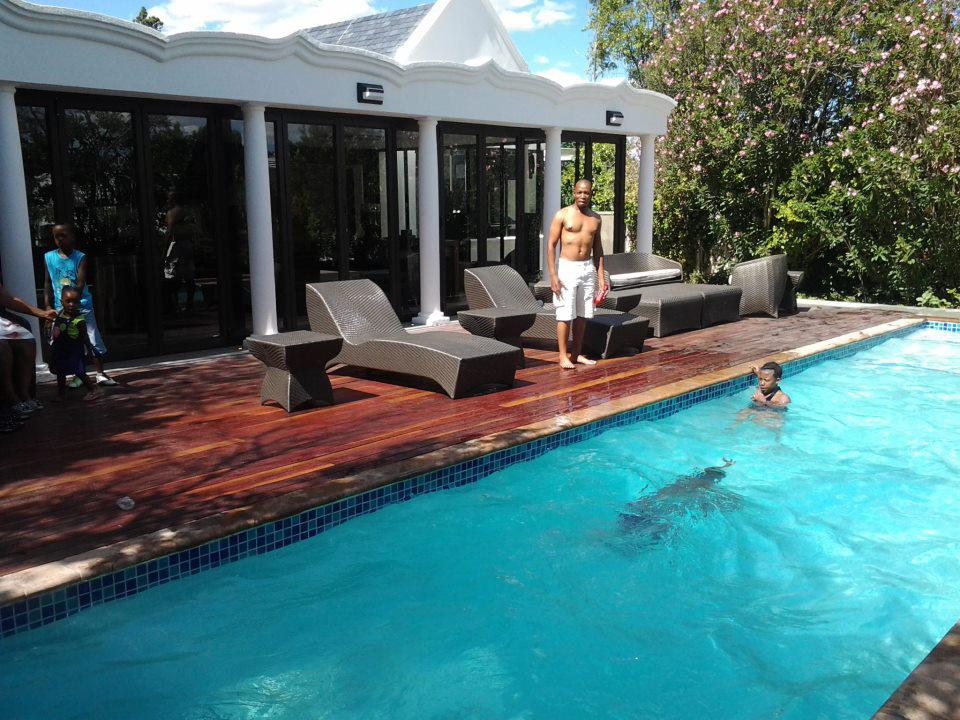
This picture was posted to Motsemme’s Facebook page in 2012 and suggests that the young businessman was very much part of Magashule’s inner circle.
Motsemme did not want to indicate why he had met with Magashule and the other ANC leaders, or whether he had been a regular guest at the premier’s official residence.
“From the outset, I would like to state that not only are your questions intrusive on my private life but they are also demeaning to me as a human being,” he said in an email.
There clearly was no shortage of information in the public domain that suggested both Lomo and Motsemme were politically connected. Motsemme’s ties to Magashule, specifically, could have been confirmed by simple desktop research. In light of this, it seems doubtful that proper due diligence on Marangrang IT would have sparked no concerns whatsoever in Vodacom circles.
But Vodacom pressed ahead and formally signed up Marangrang IT as a partner in mid-2014, paving the way for Lomo’s company to earn sizeable revenues from the cellphone firm. These earnings would be directly linked to Vodacom’s contracts from provincial government departments.
According to Lomo, Marangrang IT initially came on board as a partner in the “mobile side of the business”.
“Our role here was to up-sell cellphone and data contracts to [provincial] departments allocated to us under the Vodacom contract,” he explained.
Later, Marangrang IT also became a “purchase order vendor”, which meant the company could perform other services for government departments on behalf of Vodacom.
“This was mainly in areas of network cabling and switching, plus hardware supply,” said Lomo.
One of our sources suggested that Marangrang IT earned around R20-million in commissions and other payments from Vodacom as a result of the latter’s contracts from provincial departments.
“As for the R20-million figure, I would have to verify but given your time-frame to respond and the lockdown that might not be possible to verify,” Lomo told us.
“The man above”
According to internal Vodacom documents, the company had five “supplier development” partners in the Free State in the period between 2014 and 2017.
This included Thami Lomo’s Marangrang IT and Supana Technologies. Suping Motsemme, the nephew of Ace Magashule’s girlfriend and Lomo’s one-time employee, registered Supana in February 2015, a clear sign that he would try and secure a bigger slice of the Vodacom pie for himself.
Sources who had worked with some of Vodacom’s other BEE partners in the province claim they never really stood a chance against the two politically connected companies.
Vodacom first gifted the most lucrative work to Marangrang IT and then, later, to Supana Technologies, according to our sources.
“At one of the first meetings with Vodacom in 2014 we were told that we would get to do work on two or three provincial departments, but we never got the work. Our company spent lots of money on training technicians for the project, but we had to let them go,” a former employee at one of the companies told us.
A second source from the Free State ICT scene recounted troubling encounters he allegedly had with Vodacom employees.
“The people from Vodacom were telling us that they were under political pressure to give more work to Marangrang. The same thing happened later when Supana came into the picture. They said the pressure came from the man above,” claimed the source.
He said he had no doubt that “the man above” was a reference to Magashule.
Meanwhile, the two-year contracts Vodacom had secured as a result of the 2014 Free State transversal tender came to an end in August 2016. After that, provincial government departments procured voice and data services on a month-to-month basis. But Vodacom would soon be placed on a path leading to new fixed contracts and even more revenues from the provincial government.
In September 2016, Vuyani Jarana announced that Vodacom had won the national transversal contract first advertised by the National Treasury earlier that year. It was a huge development.
The transversal contract, known as RT15-2016, would allow the cellphone giant to score contracts with national and provincial departments, municipalities and other state institutions all over South Africa. It would be valid for four years and stood to earn Vodacom more than R5-billion in revenues, according to a National Treasury document.
Winning the RT15-2016 tender opened the door to government contracts, but it didn’t exactly guarantee them. If, for instance, provincial departments in the Free State could convince the National Treasury that they could get voice and data services at cheaper rates from other providers, they didn’t have to sign up with Vodacom.
The cellphone giant would therefore again have to go and ensure that Magashule’s administration picked them, just as it had done in 2014.
“You still had to go and sell,” as Jarana phrased it.
Vodacom wins big in the Free State – again
Entries in Magashule’s diary, other documents, information from sources and feedback from Vodacom and Jarana enabled Scorpio to piece together a timeline of events that unfolded after the cellphone firm had won the national transversal contract in 2016.
The sequence of events shows that Vodacom significantly increased Supana Technologies’ “partner commission payments” around the time that its top executives sought to “sell” their services to Magashule and his executive committee. Their lobbying efforts were successful, and Vodacom ultimately clinched contracts from every single department in the province.
According to Vodacom, its executives met Magashule during the 2017 SONA “as one of a number of planned engagements”.
The following month, Magashule was supposed to have a “meeting with Mr Vuyani & Vodacom Team (V.C.) with the CEO” at Free State House, according to the premier’s diary. This is the same property featured in the swimming pool photo Suping Motsemme posted on his Facebook account in 2012.
Jarana said he and Joosub had travelled to Bloemfontein to meet with Magashule and his executive committee.
“We went out there to present to the Exco, not just Ace, it was part of a presentation and we had to show what investments we had made in the province. The whole thing was above board,” stated Jarana.
The next engagement involving Magashule and Vodacom’s top brass was scheduled for 17 July 2017.
According to the former premier’s diary, he was supposed to have a “meeting with CEO and COO Vodacom in Parys”, Magashule’s hometown.
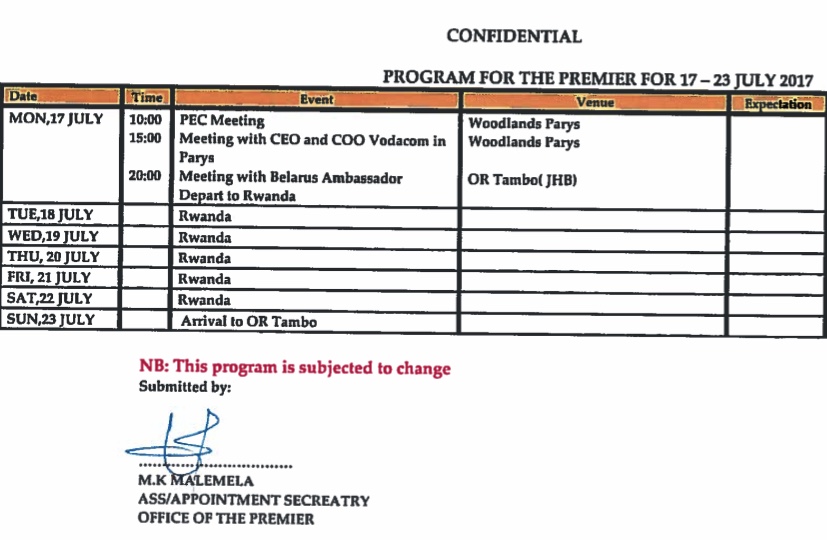
But Vodacom strongly denied that its CEO attended such a meeting. “Mr Joosub did not meet with Mr Magashule in Parys, and any contention which suggests he did is factually incorrect,” the company stated.
It is not clear whether anyone else from Vodacom ended up attending the scheduled meeting. What is clear, however, is that Vodacom had managed to win over the Free State government at some point during this timeframe.
On 30 August 2017, roughly a month and a half after the Parys meeting was supposed to have taken place, Godfrey Mahlatsi, the provincial treasury’s CEO, wrote a letter to Cell C in which he confirmed that all of the province’s departments would soon be entering into contracts with Vodacom.
“Please be informed that as from 1 October 2017 the Free State Government Departments will be participating on the National Treasury RT15-2016 … which was allocated to Vodacom. Kindly provide Vodacom with necessary cooperation,” Mahlatsi wrote to Cell C.
The letter was filed as part of legal proceedings Cell C instituted against the provincial government in 2018.
Up until August 2017, Cell C had held contracts with four provincial departments, namely sports, cooperative governance, human settlements and social development. But thanks to Vodacom’s successful negotiations on the back of the RT15-2016 transversal, it had now secured contracts from all eleven departments in Magashule’s province.
Motsemme’s Vodacom boon
Vodacom’s victory in the national transversal contract and its subsequent negotiations with the Free State government coincided with a significant change in fortune for the Magashule-linked Supana Technologies
In February 2017, Jarana and an executive from the central region signed an instruction to terminate Marangrang IT’s contract as one of Vodacom’s regional partners.
“The new partner on the new contract has been appointed and base movement will now take place and move to Supana Technologies,” reads the document.
The “base” refers to a collection of cellphone subscriptions, which in this context would have included Vodacom subscriptions for Free State government employees.
Other Vodacom documents shed more light on how the process worked.
A partner like Motsemme’s Supana Technologies would earn “partner commission payments” based on the number of cellphone subscriptions that formed part of whichever “base” Vodacom allocated to them.
According to one document, Supana Technologies stood to earn around R200,000 a month thanks to Vodacom’s decision to take the base subscriptions from Marangrang IT and other rivals and hand it to Motsemme’s company.
One of our sources explained that this was essentially money for jam.
“The partner company automatically receives between five and seven per cent of Vodacom’s revenue on the base, so they didn’t have to lift a finger for this money,” said the source.
Like Magashule, Motsemme chose not to respond to specific queries.
“I do not intend to deal with your questions in the sequence that you have listed them, but I must state that my company went through a rigorous screening process at Vodacom. The decision of Vodacom to award me the opportunity to be their partner did not rest with me,” he stated.
“It seems to matter to you that because my aunt is with Comrade Ace Magashule, I am therefore not entitled to source any work from any private or public sector. Any opportunity that I may have had in the past and in future, will simply be because I have some form of relationship with Comrade Magashule and therefore I would have committed a crime in attaining such an opportunity, necessitating an investigation, the businessman added.
Motsemme’s full response is available here.
Supana Technologies’ “partner commission” earnings for the base contracts would be small compared to what it stood to earn from the other work Vodacom could throw its way.
Motsemme’s company was now eligible to do network cabling, hardware installations and related work at government departments, just as Marangrang IT had done.
Vodacom went a step further and elevated Supana Technologies to the coveted position of national partner. This meant Supana could do work on behalf of Vodacom not only in the Free State but all over South Africa.
For such a young company, Supana Technologies had ascended to the top of Vodacom’s preferential procurement hierarchy in remarkably little time.
According to one of our sources, Supana’s promotion to national partner occurred mere days after it had been “on-boarded” as a regional partner in the Free State.
While Vodacom’s contracts with Free State government departments kicked into gear, Supana Technologies evidently made the most of its affiliation to the cellphone giant.
In May 2018, the company announced on its Facebook page that it had been crowned as the winner in the “fixed sales category” at Vodacom’s annual conference.
By that time, however, trouble loomed on the horizon.
The internal Vodacom investigation had commenced, and our sources suspect that this may have affected Supana’s potential earnings as Vodacom’s national partner.
“The investigation started before Supana could do a lot of fixed [network] deals, so I don’t think the company made as much money as Marangrang IT,” said the source.
Vodacom refused to indicate whether Supana Technologies’ partnership with Vodacom was still intact or whether it had been terminated.
The company may be forced to answer such questions once the Zondo Commission resumes after the Covid-19 lockdown.
For a period of just under a decade, scores of contracts awarded by the provincial government ended up benefiting people somehow connected to Magashule.
The contracts Vodacom clinched in the Free State can now be added to that list.
This saga resonates with the multitude of earlier accounts about the ANC secretary-general’s alleged role as a master state captor. These stories all suggest that Magashule leveraged government contracts in his home province to enrich friends, family and business associates.
Magashule has previously claimed that he was far removed from decisions involving contracts and other expenditure.
If this is true, one would have to marvel at the remarkable spell of serendipity that so frequently saw big deals falling into the laps of those in the Magashule clique. DM




















 Become an Insider
Become an Insider